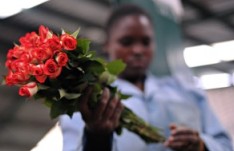NEWS: Kenyan flower sector in jeopardy as EU mulls over EPA deadline
 Brussels, 18 March 2012/ The Standard (Kenya): Kenya’s flower exports to the European Union (EU) will be subjected to a 16 per cent duty should a proposal to impose a deadline on the Economic Partnership Agreements (EPAs) negotiations sail through the European Parliament this year.
Brussels, 18 March 2012/ The Standard (Kenya): Kenya’s flower exports to the European Union (EU) will be subjected to a 16 per cent duty should a proposal to impose a deadline on the Economic Partnership Agreements (EPAs) negotiations sail through the European Parliament this year.
"A proposed amendment to the European Commission regulation 1528/2007 imposes a deadline of up to December 31, next year when all negotiations for the EPA’s must be concluded. Once passed, 18 African Caribbean and the Pacific (ACP) countries — which include Kenya that fall under this trade regime — will be deleted from the quota-free agreement," Washington Oloo, Kenya’s Deputy Head of Mission to the EU said in an interview with The Standard at his office in Brussels.
"The decision is expected in parliament this summer (June), and if passed Kenya’s flower exports will no longer enjoy duty-free access to the European market," he added.
Kenya’s flowers and vegetables are sold directly to the European market in Amsterdam, Netherlands where a demand for Kenya’s cut flowers has been on the increase.
Flower exports enjoy a duty-free access to the European market under the interim EPA’s, a fact that has enabled the flower sector to emerge as the leading export in the country. The sector made an estimated Sh30 billion in 2010.
Under attack
In the absence of the pact, Kenya’s flower exports could be subjected to a 16 per cent duty to enter the EU, which will edge them out of a market that is under attack from South American flower exports.
"The ACP Group is concerned that the proposed amendment to the Market Access Regulation exerts pressure on the governments of ACP States cto sign and ratify their EPA within the specified timeframe, regardless of whether or not the contentious provisions have been resolved," Oloo said.
Oloo said bilateral and multilateral trade negotiations are complex in nature and very often cannot be concluded in rigidly set timeframes.
"We have been negotiating the EPAs under the EAC-EU-WTO framework and it is bad to rush such negotiations without taking cognizance of their effects to our economy," Oloo explained.
EAC members were expected to sign a new 25-year trade deal known as Economic Partnership Agreement in November but did not, putting the country’s top foreign exchange earner at risk. The trade deal is reciprocal, meaning that goods from the EAC will enter the EU market duty-free and vice versa.
Should the amendment be effected, Kenya’s flowers will be taxed directly, hurting production in a sector that already faces high energy and labour costs. Oloo said the only option is for ACP countries to lobby the EU parliament not to pass the amendment as the countries continue to negotiate the EPAs.
Last week while on a visit to Brussels, Kenya’s Prime Minister Raila Odinga appealed to the EU to give EAC partner states more time to come up with a unified position on EPAs.
He pointed out that Kenya would lose heavily in the current arrangement because the rest of the EAC partner states of Tanzania, Uganda, Rwanda and Burundi enjoy the Least Developed Country status, earning their goods free access to Europe. But Kenya is not listed as an LDC.
– Luke Anami/ The Standard (Photo: Spyghana.com)
